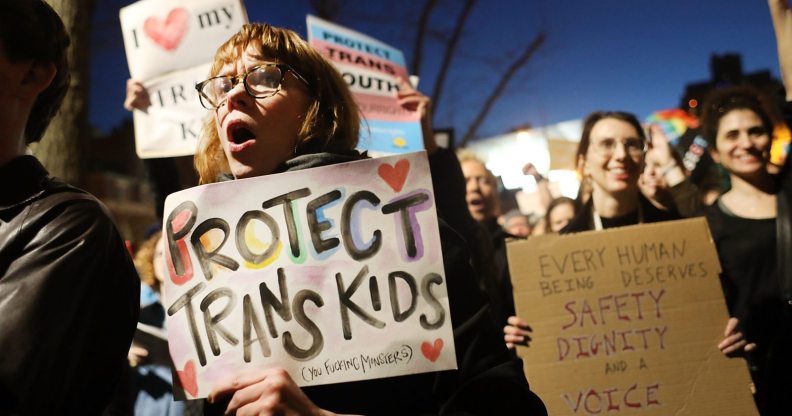Parents of trans teens say banning puberty blockers would be a ‘slap in the face’ to their children

(Spencer Platt/Getty)
In light of a landmark legal challenge to NHS prescribing of puberty blockers, families with transgender teenagers have been speaking out about their fears of the impact of the case.
The families are worried that a High Court judicial review could see doctors barred from providing their children with treatment.
The case against the Tavistock and Portman NHS Foundation Trust, which runs the only NHS gender clinic for trans youth, is being brought by online “gender critical” activists who crowdfunded more that £65,000 for the legal challenge.
The case challenges the use of puberty blockers, a “life-saving” treatment that delay puberty for young trans people.
Lawyers for the online “gender critical” activists will argue that trans youth are incapable of giving informed consent for the medical treatment, seeking to overturn a long-established legal precedent that also allows under 16s to access contraception and abortion advice without their parents’ knowledge or consent.
Banning puberty blockers would be ‘slap in the face’ to trans teens.
Families of trans youth waiting for treatment at the Tavistock and Portman NHS Foundation Trust told iNews that they are fearful of the potential impact a decision against the Gender Identity Development Service (GIDS) could have.
A father of a 14-year-old boy currently on the waiting list for the clinic said: “It would be an absolute slap in the face for his identity and every other trans person.
“Who are they to say that these people cannot live their life in the way that most suits them? It would take that option off the table.”
The dad added that his son has been on the waiting list for GIDs for more than two years, contrary to the oft-repeated claim by online “gender critical” activists that gender non-conforming children are being “rushed” into “experimental” treatment, and had been living as a boy that entire time.
“For two and a bit years now, [my son] has been living as a boy without any wavering whatsoever.
“It’s important for his well-being and his mental health, and the fact that he has periods is a complete head f**k for him. When he first came out, we thought, ‘Well, maybe it’s a phase,’ but it’s obviously not. He’s much happier being a boy.”
Claimant says trans youth too ’emotionally vulnerable’ to consent to treatment.
The case is being led by Keira Bell, a woman in her 20s who was referred to GIDS at 16 and prescribed puberty blockers to delay her puberty. As an adult, she underwent top surgery before deciding she no longer identifies as transgender.
She said: “Hormone changing drugs and surgery does not work for everyone and it certainly should not be offered to someone under the age of 18 when they are emotionally and mentally vulnerable.
“The treatment urgently needs to change so that it does not put young people, like me, on a torturous and unnecessary path that is permanent and life changing.”
The NHS says that hormone blockers “are considered to be fully reversible”.
Cross-sex hormones are not routinely offered to under-16s, while surgery is not offered to under-18s.
Eighteen-month wait for puberty blockers.
Alex Vellins, a 17-year-old trans boy who has been treated by GIDS for five years, told iNews: “I came out when I was 12 to my family, and it took them a while to accept it. I socially transitioned at 13 and was referred to the Tavistock as soon as possible.”
Alex explained that it took 18 months to be prescribed puberty blockers, and he could not get cross-sex hormone treatment until he turned 16.
He said of the treatment: “It really reduces the dysphoria. I’ve got a friend who hasn’t [got hormones], and sometimes he won’t even speak because of how high his voice is. He can’t deal with that.
“It means that I’m basically at a point where I can live a normal life, and that’s your goal as a trans person, so it’s really amazing. [If I couldn’t get treatment] I would probably be suicidal. I would be in a pretty bad place.”
Alex’s mum, Lisa, added: “When you’re dealing with a pubescent child who is developing whilst you’re waiting to go through the Tavistock and waiting for treatment, it’s heartbreaking.
“When he was finally put on blockers, it was such a relief, and almost euphoric. It’s great, just watching Alex flourish, being who he was, and relaxing into himself and growing really well into an adult.”
Lisa spoke about her fears of the impact on families and trans youth if the outcome of the legal case meant puberty blockers were no longer available.
“It is a bit scary. What you don’t hear is the positive cases. You just hear of the one negative case, but there are so many positive cases of trans kids and parents supporting their kids, and it’s such a shame that just one negative case can do so much damage to a really good service.
“To take a step back would be detrimental to the service, and wouldn’t have served us well at all. It would have been horrific if we were in that position.”
In a statement, GIDS said that it “welcomed the opportunity” to talk about its service, emphasising that physical interventions like puberty blockers are used by only “a minority” of patients and that in some cases, “doing nothing is not a neutral act”.
If you are struggling with suicidal thoughts, or are struggling with your mental health in other ways, you can contact Samaritans for free on 116 123 or email jo@samaritans.org. If you need support on issues around your sexuality or gender identity, you can call Switchboard for free on 0300 330 0630 or email chris@switchboard.lgbt.

